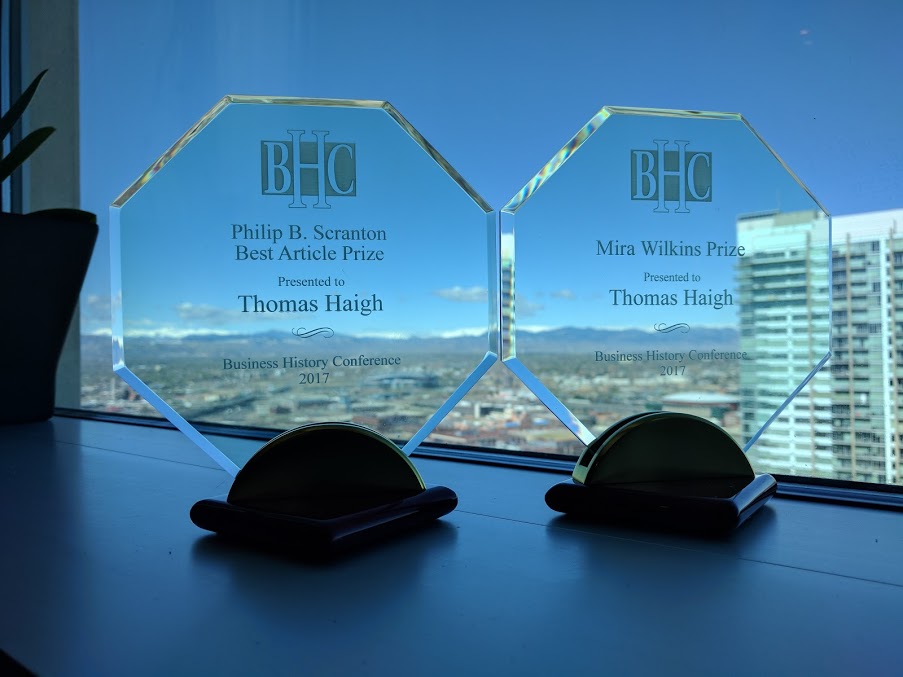- Fellowship at the Isaac Newton Institute in Cambridge
- AI History Project
- IWM Fellowship in Vienna
- Two Chinese translations
- UWM Retrolab Unveiled
- Thoughts on the eve of "Rebuilding and Rethinking: Grand Narratives in the History of Computing"
- "Becoming Universal" in Santa Cruz, Chicago, Milwaukee and CACM
- Klara von Neumann, a "Lost Woman of Science"
- Depictions of IT Work -- a series in CACM
- Keynote at HAPOC 2021 in Zurich
You are here
"IBM Rebuilds Europe" Wins Scranton & Wilkins Prizes from the BHC
The Business History Conference presented me with two awards for the article “IBM Rebuilds Europe: The Curious Case of the Transnational Typewriter,” Enterprise & Society 17:2 (June 2016):265-300. These are the Scranton Prize for the best overall article in the BHC's journal Enterprise and Society and the Wilkins Prize for the best article in the same journal dealing with international or comparative topics. (Online at E&S) (preprint online locally)

Here's the abstract:
In the decade after the Second World War IBM rebuilt its European operations as integrated, wholly owned subsidiaries of its World Trade Corporation, chartered in 1949. Long before the European common market eliminated trade barriers, IBM created its own internal networks of trade, allocating the production of different components and products between its new subsidiaries. Their exchange relationships were managed centrally to ensure that no European subsidiary was a consistent net importer. At the heart of this system were eight national electric typewriter plants, each assembling parts produced by other European countries. IBM promoted these transnational typewriters as symbols of a new and peaceful Europe and its leader, Thomas J. Watson, Sr., was an enthusiastic supporter of early European moves toward economic integration. We argue that IBM’s humble typewriter and its innovative system of distributed manufacturing laid the groundwork for its later domination of the European computer business and provided a model for the development of transnational European institutions.
Here's roughly what I said in accepting the Scranton Prize (announced first):
Recognition from this community means a lot to me. I first attended the Business History Conference back in 2000 at the Palo Alto meeting, and my first published paper was in Business History Review. I'd like to stress that ALL of the painstaking research on this paper was done by my coauthor Petri Paju. I've been a fan of his research on the history of IBM since I first heard it as a fellow participant in the European Science Foundation project "Software for Europe." Its organizer, Gerard Alberts, challenged participants to find ways to explain the development of trans European identity through the history of information technology. Quite a challenge.
Petri recruited me as co-author after his paper was rejected by Enterprise and Society! So this award is a testament to collaborative writing. That's something historians don't do so much in general, though business historians have embraced it more than most. In this case it unquestionably produced something neither of us could have created on our own. My contribution was merely to revise, reframe, cut, focus, and align claims with evidence. I worked quickly and had fun -- there's a cameo by Hitler, a quote from J.G. Ballard, and a reference to Miss Congeniality.
That immediacy gave my work on the paper a real sense of flow, but there's also a surprisingly emotional component to the writing process that I hope comes through. As someone who grew up as a European leftist, and whose graduate training is as much in social and labor history as in business history, I don't necessarily assume that foreign policy interventions by American multinational firms will produce good outcomes. Thomas Watson Sr. is a character whose own biographers, and son, seemed to have difficulty relating to. We call him a "fusty autocrat." Yet we discovered that under his leadership IBM played an unexpected part in building certain aspects of Western Europe that our generation took for granted. Both helped to make sure that the second half of the twentieth century was quite unlike the first.
A few moments later I returned to accept the Wilkins Prize:
The rewards of good research are often intrinsic. My favorite description of my work dubs me a writer who tells "elegant stories that superimpose very uninteresting topics in a thoughtful, academic manner." That could describe a lot of us, on our best days. Many of us still have the privilege, and it is a remarkable privilege, of being able to spend some of our time writing about topics, and taking perspectives, without worrying about whether anyone will find them interesting. We can't then complain if, once our work is published, it turns out that almost nobody does.
The topic of typewriter manufacturing and supply chains in the 1940s didn't seem particularly likely to change this pattern. The paper appeared in Spring, 2016. I don't know how many of you follow the news, but a few things that happened later that year which may have helped to make our work seem a little more interesting to the prize committees.
So as well as the prize juries, Phil [Scranton], Andy [Popp], Roger [Horowitz] and everyone else who make the BHC and Enterprise and Society so vibrant and inclusive, I must also thank some of the people who have made these such interesting times for international business history: Boris Johnson, the voters of England and Wales, the people of Wisconsin, Michigan, and Pennsylvania, and, of course, Vladimir Putin.
Theme by Danetsoft and Danang Probo Sayekti inspired by Maksimer